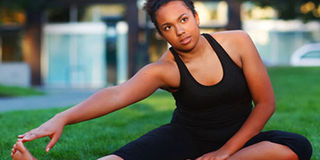Eating right during workout

Exercising is highly recommended but people should know what specific exercise they should undertake to achieve their intended results.
What you need to know:
Advice. While working out, one needs to eat enough in order to stay energised, build muscles, and speed up recovery.
The myth is, to lose weight you need to lessen your food intake and intensify workouts. What often happens is that one workouts and compounds their grief by not eating enough or not eating at all. But exercising is just the tip of the iceberg, the real task is to feed your body with the necessary nutrients essential for burning the calories, staying energised, building muscles, and speeding up recovery after a workout.
Whereas it is true that one needs to limit their calories intake when trying to lose weight, a perfect balance has to be maintained between food and exercises.
Betty Nansubuga of indulge Maternity Spa & Gym, says eating a healthy meal one to two hours before and after exercises is a good way to meet your nutrient needs without wasting the routine.
Research shows that starting a work out on an empty stomach maybe harmless if you do not have chronic diseases like high blood pressure or diabetes. In fact, it is advised that the best time for such a workout is in the morning, when the body still has some energy stored. However, starving yourself for hours and then going for a run if not exhausting is wastage of time.
But Dr Isaac Isire, a physician at empowerment of disadvantaged youth and children, strongly discourages this: “It is suicidal to do workouts without eating at least a snack. Exercise should at least be on a moderate stomach, not too full nor empty, just enough to vitalise the metabolism.”
He adds that doing any vigorous activity on a hungry stomach could result into dizziness, vomiting and in some cases fainting.
When starved, the human body lacks enough energy to fuel the workouts hence using up your muscles. Additionally, a starved human body tends to go into a conservation mode. Here it reserves the remaining fat in your body as a safety deposit for the period it will last without food. It is dangerous to push it beyond its limits.


